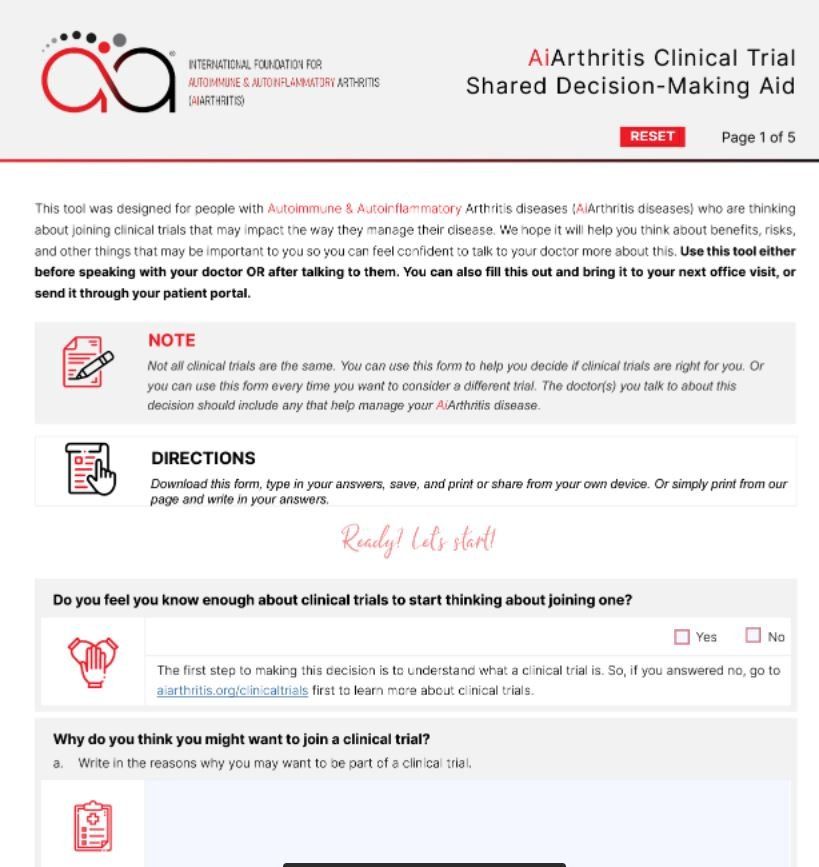- HOME
- ABOUT US
- WHAT IS AiARTHRITIS
- Diseases
- Rheumatoid Arthritis (RA)
- Psoriatic Arthritis (PsA)
- Systemic Lupus Erythematosus (SLE)
- Sjögren's Disease (SD)
- Axial Spondyloarthritis (AxSpA)
- Crohn's Disease
- Sarcoidosis
- Relapsing Polychondritis (RP)
- Systemic Sclerosis/Scleroderma (SSc)
- Behcet's Disease (BD)
- Palindromic Rheumatism (PR)
- VEXAS
- Antisynthetase Syndrome (ASS)
- Mixed Connective Tissue Disease
- JIA
- Familial Mediterranean Fever (FMF)
- HIDS (hyper-IgD syndrome, a mevalonate kinase deficiency)
- Cryopyrin-Associated Periodic Syndromes (CAPS) - Familial Cold Autoinflammatory Syndrome, Muckle-Wells Syndrome
- Schnitzler Syndrome
- Chronic Nonbacterial Osteomyelitis (CNO)/Chronic Recurrent Multifocal Osteomyelitis (CRMO)
- Still's Disease
- All Diseases
- Diseases
- OUR WORK
- RESOURCES & TOOLS
- GET INVOLVED
- CONTACT US

Thinking about joining a clinical trial? Whether you are just starting to think about it OR found one and want to start weighing the pros and cons, here is a tool for you!
OR - download if you are a healthcare professional and are either interesting in learning more about this tool or possibly considering sharing with patients.
Clinical Trials
We are dedicated to helping people affected by AiArthritis diseases connect to the right treatment at the right time and that meet the individual needs of the patient. To do this, we must support innovation and the development of new therapies.
Do you know enough about Clinical Trials? Clinical trials are research studies conducted to evaluate different intervention, for example testing a new drug or an attempt to prevent disease activity (or both!) They help researchers determine if the intervention is safe, effective, and potentially better than the standard or current therapeutic options. The research conducted in trials has the potential to improve our lives and the lives of millions around the world. For these reasons,
AiArthritis strongly supports participation in clinical trials
if it is deemed the best therapeutic decision for the individual.
Community and Individual Needs
At our organization, those with lived experience (the patients, parents of juveniles, care persons for adult patients) - and their perspectives, opinions, and individualized needs are at the core of all we do. We listen, we communicate, and then assess what we can do to help those affected by AiArthritis diseases in ways that are both personalized and collaborative.
Over the last several years, we have invested thousands of hours participating in information patient-peer discussions, as well as patient-led focus group research - both aimed at collecting data to help researchers understand what patients want most. What we've found:
- Most people affected by AiArthritis diseases do not believe there is such as thing as "one treatment" to manage their disease (which often also includes co-morbidities). Additionally, most prefer a mix of pharmacologic and non-pharmacologic interventions.
- Atypical might be more common than Typical.
- What works for one doesn't work for all.
- Access to treatments, fear of treatment side effects, and maintaining disease control are top drivers when choosing therapeutic management plans.
These statements are based on research conducted in our A Community Team (ACT) project and observing comments within patient groups and advisory panel discussions.
Why Would I Participate?
What about possible benefits and risks associated with clinical trials? One thing we want those recruiting for trials to understand is the 'why' a patient with AiArthritis diseases may choose to participate in a study. Those affected by AiArthritis diseases want their chosen therapies to improve quality of life and control the disease and its progression. Decisions to change treatments - whether that be by participating in a clinical trial or otherwise - is strongly driven by the need for continuity of care. Therefore, if a person with an AiArthritis disease is currently well managed on their existing therapy, it would likely not be recommended to stop treatment and start a new therapy being tested in a clinical trial. However, patients with refractory disease (hard to treat), who have experienced continual failures on other medications, or who have issues accessing treatments otherwise, may be great candidates to explore participating in clinical trials.
Can I participate? Clinical trials have inclusion and exclusion criteria, which dictates who can participate in the research study. These requirements are necessary to have to that those studying the intervention can analyze what is working (or not working) in a larger group of people. This also enables them to measure the probability that the therapy will be effective and safe. But in diseases, like those that are "auto" (autoimmune/autoinflammatory) - where both onset and progression can vary greatly per individual - these limitations can produce results that are true in only a percentage of the population (i.e. those who are most alike).
If you are interested in participating, visit the site that explains more about the trial - and there you should be able to find out if you meet their criteria. If it's not listed, there will be a contact person mentioned - reach out and they will provide you with more information.
As we move into a world of precision medicine - which studies things like biomarkers (blood, body fluids), genetics, and patient subgroups, the design of research (and clinical trials) will change. We are addressing this in our Preparing Patients for Precision Medicine Trials project.
The answers start with Shared Decision-Making
How to start the conversation, and what questions should I be asking?
Before considering a change to your healthcare treatment plan, first make sure to speak with your rheumatologist to determine if trial participation is right for you. Here are some basic steps to follow:
01
Education
You can learn more about clinical trials in a variety of ways. A great place to start is ClinicalTrials.gov website or by visiting the Food & Drug Administration or European Medicines Agency sites. You can also ask your doctor or local research clinics.
Write down any questions that you think of, and bring them to your next appointment to have your physician address with you. You can start the conversation with a simple question, "Could a clinical trial benefit me?"
02
Personal Assessment
Weigh the pros and cons. If you are doing well on your current treatment, it may not be the best time for you to try and switch therapy. However, if you are not doing well on your current treatment, have failed several options currently on market, or interested in participating in innovative new therapies, then trials may be for you!
03
Expert Advice
We cannot stress enough the importance of speaking to your rheumatologist about trial participation. They can provide you with more information about the pros and cons - specific to YOUR individual needs.
Your time in the office is limited, so come prepared! If you have the option available to you, consider contacting your office beforehand (like through an online patient portal or platform) to ask your questions.
04
Choice
Ultimately, it's your choice. If it seems like a good option to help control your disease, or prevent complications in the future, and you have access to the facility and the time to participate, then trials can be a very rewarding and lifechanging experience!
Don't let external barriers get in the way, there are resources available to help with things like costs, and travel expenses.
Featured Trials
How to Final a Clinical Trial
Online Search
Search your disease and the term clinical trial. You also may want to search your city to narrow the search.
ClinicalTrials.gov
If there is a trial happening, it will be listed on this site. International trials, too!
Clinics/Research Centers
Search for local research facilities in your area. Most websites will be updated with current research opportunities.
Ask Your Doctor
Unless your doctor office participates in clinical trials, it's likely they won't mention this option unless you bring it up!

Thinking about joining a clinical trial? Whether you are just starting to think about it OR found one and want to start weighing the pros and cons, here is a tool for you!
OR - download if you are a healthcare professional and are either interesting in learning more about this tool or possibly considering sharing with patients.
Sign up for our newsletters
International Foundation for AiArthritis
6605 Nottingham Ave.
St. Louis, MO 63109-2661
Toll Free: 1-877-609-4226
Text: 1-314-282-7214
Copyright 2024. All rights reserved. Information on this site is intended for informational purposes only Our foundation does not engage in the practice of medicine. Please consult a physician to obtain personal healthcare and treatment options. 501(c) 3 Nonprofit Tax ID: 27-1214308.





